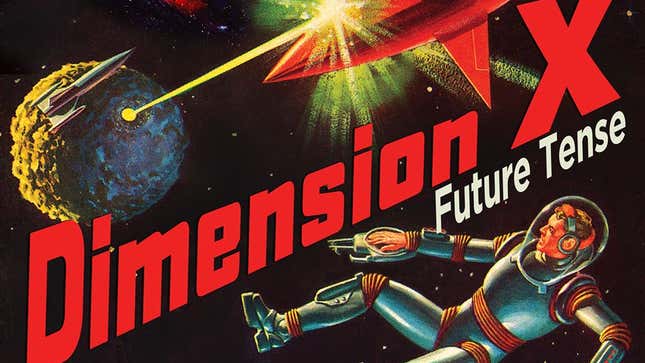
Nine years before Rod Serling brought America The Twilight Zone, NBC had a science fiction anthology series that offered very similar dark tales of potential dystopia and future-set malarkey. It was called Dimension X, featuring stories by some of the most famous sci-fi writers of the 20th century, and the reason you’ve likely never heard of it was because it was on the radio, not TV. The good news is, you can listen to it right now.
“Adventures in time and space, told in... future tense!”
These are the words that begin every episode, as introduced by “The Voice of God,” Norman Rose, with toe-curlingly embarrassing gusto. However, what follows in each episode tends to be some really impressive and astonishingly pessimistic science fiction tales, well performed, with the added pleasure of being set in futuristic-sounding years like “2004" and “1986.”
Episode 10 is a pretty good place to start. Called The Green Hills Of Earth, based on the short story by Robert A. Heinlein, it’s a phenomenal tale of a spaceship engineer who is blinded by radiation, and thus unemployable. He begins hitching rides on ships wherever he can, entertaining crews with his own folk tunes, eventually trying to return to Earth before he dies. It’s a sad, gentle tale, packed with excellent songs, that so effortlessly moves the drifter tale of riding the trains into a sci-fi setting.
Then episode 11 provides with two fifteen-minute stories by “one of our most brilliant young science fiction writers,” Ray Bradbury. Each is a gut punch of a tale. First is There Will Come Soft Rains, which tells of a 1980s American town fully automated by robots for every human need, and its gradual winding down and failure after a nuclear bomb is dropped nearby. It’s macabre and morbid, and told with a cheery indifference in Rose’s mellifluous baritone. “The water tinkled over the charred West side of the house. The side which had been facing the blast. It was blank, except in five places. One of the five places was a silhouette of a man mowing a lawn, just as he’d been the instant the radioactivity burned his image into the side of the house.”
The second half is Zero Hour, in which children all over the country are playing the same game, Invasion. In it, they “pretend” they’re preparing for an alien invasion by their friend, Drill, while their parents patronizingly look on at their impending doom. I’d previously seen an attempt at the story in the half-decent 2014 ABC series The Whispers, a Steven Spielberg-produced sci-fi that didn’t get a second season. It’s fair to say that Dimension X’s 15-minute version does a much better job of delivering the story.
There are 50 episodes in total, and every episode has been preserved (albeit a couple in poor quality). This is thanks to the utterly wonderful Archive.org, a never-ending museum of human artifacts. A few of them were sponsored by the breakfast cereal of champions, Wheaties, which makes for some spectacularly inappropriate tonal shifts from the swivel-eyed enthusiasm of the Wheaties voiceovers and jingles (“Just you see how Wheaties at 7 can help at 11!”) to the introductory doom of alien invasions or apocalyptic horror.
It’s worth noting that there are a couple of different archives on Archive.org, one of which has all 50 episodes but not as well edited, the other better preserved but with only 29 editions. Exploring these leads to extraordinary and grim discoveries, like the recording of George Lefferts’ The Man In The Moon which includes the last five minutes of a spectacularly racist program called Jungle Jim, about a white woman’s fear of “native men”. Or this recording of the episode A Logic Named Joe, broadcast live on July 1st, 1950, that begins with a news bulletin about US troops rolling in to defend South Korea. It’s deeply chilling how much it sounds like it could have been from the scripted content of an episode.
Using names like Bradbury, Heinlen, Edna Mayne Hull and Isaac Asimov meant their stories were already going to be great, and the production and performances—while of their time—deliver them superbly. And talking about “of their time,” yes, you’ll not be surprised to learn these are often incredibly sexist, as well as racist by omission. (I should say as a disclaimer that I’ve not yet listened to all 50, in case one should prove to be horrendously offensive.) If anything, it’s surprising just how often they aren’t littered with bigotry, given their decade.
I’m so glad I discovered this, stumbling upon it while idly searching for old science fiction radio programs to listen to as I fall asleep. Sure, it’s fun that some of it is hokey, and to giggle at just how wrong they get their predictions of the ‘80s, but actually this is some damned fine drama. And a treasure trove of excellent stories that I desperately wish could inspire a new generation of science fiction games.